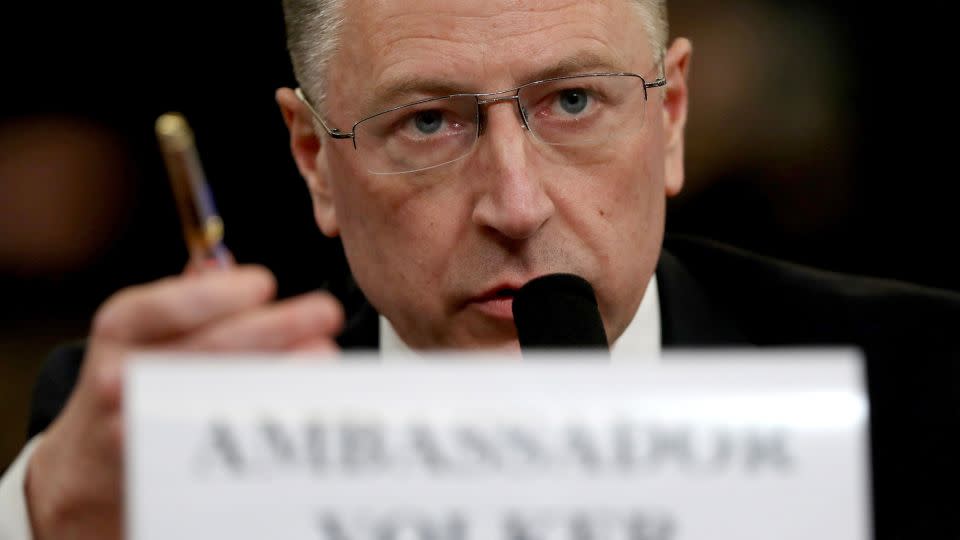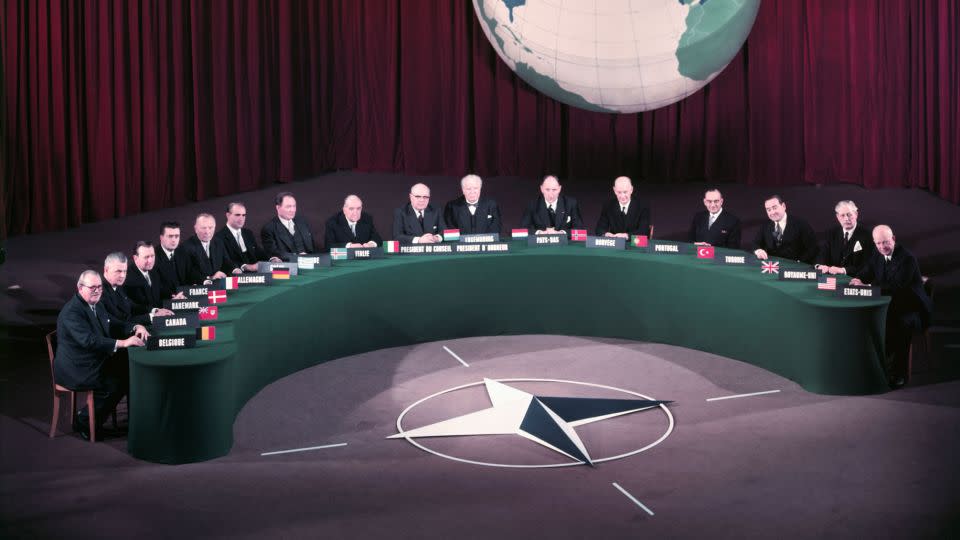Congress acted to protect NATO. But it might not be enough to stop Trump
A version of this story appeared in CNN’s What Matters newsletter. To get it in your inbox, sign up for free here.
Lawmakers from both parties last December may have been anticipating former President Donald Trump’s current NATO trash talk when they quietly slipped language limiting a president’s power to pull the US out the alliance into the annual defense policy bill, which passed with bipartisan support.
Trump boasted at a weekend campaign rally that as president he told an unidentified NATO leader that he would encourage Russia to “do whatever the hell they want” with member countries who are in arrears on defense spending. The whole point of NATO is supposed to be that members act to defend each other if attacked.
President Joe Biden seized on Trump’s recent NATO bashing, suggesting in Tuesday remarks from the White House that Trump was the first president who “bowed down” to a Russian dictator, which Biden said was “dumb,” “shameful,” “dangerous” and “un-American.” Add that criticism to a chorus of alarm from NATO and European officials after Trump’s comments and in the midst of House Republicans’ blockage of additional aid for Ukraine.
Trump’s desire to pull out of NATO
The post-World War II alliance of Western democracies was built around NATO, but Trump has long complained that the US is getting a raw deal with the organization, paying too much and getting too little.
Trump’s ultimate goal, writes CNN national security analyst Peter Bergen, has long been to pull the US out of NATO, which was formed in 1949 to contain the threat of the Soviet Union and the spread of communism and is now organized around deterring Russian President Vladimir Putin.
CNN’s Jim Sciutto, in a forthcoming book, quotes a former official in both the Trump and Biden administrations who predicts a Trump election win in November would mean “the US will be out of NATO.” Sciutto also writes about how Trump nearly pulled the US from the alliance during a 2018 NATO meeting.
At the same time, Trump tried to claim credit, arguing it is his tough talk and not the threat of Russian invasion that has caused NATO member countries to increase their defense budgets in recent years.
What’s to stop him?
If Trump wins the 2024 election and does turn on NATO, he would run into that new language from Congress, which says the president “shall not suspend, terminate, denounce, or withdraw the United States from the North Atlantic Treaty” without either a supermajority vote in the Senate or an act passed by the full Congress.
When I asked the former US Ambassador to NATO Kurt Volker about what Trump could do to undermine NATO as president, he first pointed out that Trump was boasting about his interaction with an unnamed world leader rather than promising future action.

The Constitution, Volker noted, says the Senate must be involved with ratifying treaties but it is silent on the subject of withdrawing from a treaty. Any court battle could take years.
Alternatives to withdrawal
Rather than attempting to withdraw from NATO, a second Trump presidency could allow his allies to pursue a policy of making NATO “dormant,” an idea pushed by at least one Trump-allied think tank.
Nobody knows exactly what that would look like, Volker said, but the president has immense power over how the US interacts with its allies.
“There’s lots of things that you can do administratively as the commander in chief that would still be very disruptive for NATO,” Volker said.
A president could reduce the number of exercises Americans take part in with NATO allies, further reduce troop presence in Europe, withhold payments to the NATO infrastructure or cut down on the US military budget.
The US would still be bound, under this type of scenario, by the pledge to defend other NATO nations, but it would not be prepared.
“It’s not just enough to say, yes, we will fight together,” said Volker. “You actually have to have the capabilities.”
Americans lead NATO by design
If Trump wins the election this year and then seeks as president to reduce American military participation, he could, in theory, recall the NATO Supreme Allied Commander Europe.
Gen. Dwight D. Eisenhower first held the job after NATO’s founding, and ever since, the top NATO commander has always been an American admiral or general. NATO’s power to deter attacks on other countries rests in large part on American nuclear weapons, and so it is appropriate that an American service member sits atop the NATO structure, according to Max Bergmann, director of the Europe, Russia, and Eurasia Program at the Center for Strategic and International Studies.

Pulling American generals out of NATO might force other NATO countries to seek their own nuclear deterrents. Part of the reason Europeans have not pursued a collective European military is by American design and a result of security provided by NATO, Bergmann said.
Countries are eager to be protected by Article 5 of NATO’s charter, which is the principle that an attack on one member is an attack on all of the members. Sweden and Finland have both worked hard to join after Russia invaded non-member Ukraine. Finland joined in 2023, and Sweden is inching closer to accession.
That provision that Trump dislikes has only been invoked one time, after 9/11, when the US and NATO allies invaded Afghanistan after terror attacks brought down the World Trade Center and struck the Pentagon.
More members hit 2% benchmark
Trump frequently complains that NATO members other than the US don’t pay dues, which is a misstatement of facts. Members are supposed to spend a minimum of 2% of their GDP on defense, but it is just a guideline that doesn’t require payments to NATO or the US. Multiple NATO countries do not hit that benchmark, although spending has risen since Russia’s invasion of Ukraine.
“That argument is weaker and weaker, because allies are indeed spending more and doing more,” Volker said.
NATO’s charter is a relatively short and simple document. Its section on how a country withdraws from the alliance is further evidence of how central the US is to the organization: A country wishing to withdraw must notify the US a year before it plans to withdraw.
No country, by the way, has ever withdrawn from NATO, although France did not take part in NATO’s military operations from the mid-1960s until 2009.
A difficult relationship to unbreak
If Trump is reelected and chooses to hollow out NATO or make US participation dormant, it would sever ties that future presidents might have trouble repairing.
“It’s just like any relationship,” said Bergmann of the likelihood of permanent damage if Trump were to materially alter the NATO alliance. “This would be seen as the US basically having a massive affair and like cheating on Europe. Could the marriage be restored? Well, potentially. But it would require, I think, a lot of effort on the part of future administrations.”
Marco Rubio is not worried
Sen. Marco Rubio of Florida was a sponsor of the new law meant to prohibit a president from leaving NATO. Appearing on CNN’s “State of the Union” on Sunday, he dismissed the threat posed by Trump.
“He’s telling a story,” Rubio said, adding, “He doesn’t talk like a traditional politician, and we’ve already been through this. You would think people would’ve figured it out by now.”
“I have zero concern, because he’s been president before. I know exactly what he has done and will do with the NATO alliance,” Rubio said, although he added, “But there has to be an alliance.”
For more CNN news and newsletters create an account at CNN.com


